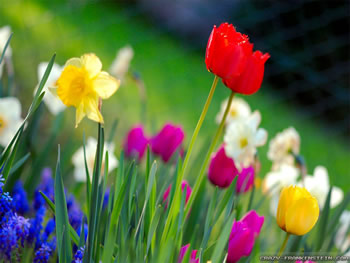The "Backward Life" of Lenten Spring
For Sunday March 25, 2012
The Fifth Sunday in Lent
Lectionary Readings (Revised Common Lectionary, Year B)
Jeremiah 31:31–34
Psalm 51:1–12
Hebrews 5:5–10
John 12:20–33
This week marks the official beginning of spring. Warmer days are overtaking winter darkness. My neighbor's cherry trees have blossomed, and I've noticed more bird song with my early morning coffee.
The Welsh physician and poet Henry Vaughan (1621–1695) described this magical time of year in one of my favorite poems, The Revival:
Unfold! Unfold! Take in His light,
Who makes thy cares more short than night.
The joys which with His day-star rise
He deals to all but drowsy eyes;
And, what the men of this world miss
Some drops and dews of future bliss.Hark! How His winds have chang’d their note!
And with warm whispers call thee out;
The frosts are past, the storms are gone,
And backward life at last comes on.
The lofty groves in express joys
Reply unto the turtle’s voice;
And here in dust and dirt, O here
The lilies of His love appear!
Life normally ends in death. But spring reminds us that the opposite is also true, that life follows death. Spring is a time when "the frosts are past, the storms are gone, / And backward life at last comes on." This "backward" life-from-death in nature contradicts our normal expectations. And what's true in nature is even more true in God's grace.
 |
Cherry blossoms, Washington, DC. |
So much of what Jesus says in the gospel of John is symbolic and metaphorical. But I read this week's gospel in a simple and literal way: "I tell you the truth, unless a kernel of wheat falls into the ground and dies, it remains only a single seed. But if it dies, it produces many seeds. The man who loves his life will lose it, while the man who hates his life in this world will keep it for eternal life (John 12:24–25, NIV). This saying of Jesus was so central to his mission and message that it occurs in all four gospels (and twice in Luke).
During Lent Christians "give up" something as an outward expression of an inward transformation. To give up something is to relinquish it, to renounce it, to forfeit or lose it, or as Jesus says, to die to it. Jesus hints at the ultimate "loss" anyone might experience, to give up life as normally lived in the world in order to gain a newly enriched life. Conversely, to grasp, to clutch, to try to control every variable of life, this is the way to death and loss.
 |
California wild flowers. |
To give up what we can never keep is to gain what we can never lose (see Luke 14:33).
I surveyed a few friends to learn what they've given up for Lent. One gave up his addiction to evening sweets. Another gave up alcohol. A third friend recalled how as a child his mother was quite strict at Lent; none of the meals they ate during Lent included any animal products. I also read about a scholar whose spiritual director advised him to give up reading for Lent. A physicist friend spoke of his loss of identity when he took a job in industry. Another faculty friend going through the tenure process spoke with candor about an idolatry in himself about his position, a grasping after security that he wished to relinquish.
It's easy to deepen these disciplines of loss, death and renunciation. Some losses are voluntary, like giving up a lifelong dream, a bitter memory, a past failure, anger at parents or children, my expectations of others, plans for the future, or a broken friendship. Maybe I need to relinquish my obsessive attempts to control, which are only thinly veiled forms of anxiety, over my time, money, and reputation.
I wonder how Peter gave up what must have been unbearable regret at denying Jesus, especially after he boldly denied that he would ever deny him. How did he move on? Or how did Paul let go of the knowledge that he helped to murder Christians?
Still other losses are involuntary, like the death of a loved one, sickness, injury, or getting fired from a job.
A few years ago I read a book by the Benedictine nun Joan Chittister called Scarred by Struggle, Transformed By Hope. She observes how experiences of loss bring great pain. Such pain can be intensely private and personal. Deep losses hurl one into an “inner storm” of “strange forces.” God’s call, says Chittister, is that we move from isolation to independence, that we recognize that life is richer than any single loss. This struggle and pain of giving up something, says Chittister, is “an unsparing lesson but a necessary gift.”
Chittister counsels Christians to cultivate two virtues.
 |
The first virtue is detachment or indifference. This is the recognition that there's not only one way to live life, and instead the affirmation that all of life and its many stages are gifts with possibilities for joy. In detachment we let go of something; we give up the propensity to clutch and hoard. When we lose or relinquish something, we remain confident that God is a loving Father who knows what we need, and who has other good and even better things to give us. To give up something is not a zero sum game in which there is only further and further loss; rather, it is to give up one thing, even good things, to gain something greater. I like what Chittister says: “Detachment based on negation rather than an awareness of endless abundance is a not a solution.”
Detachment frees me to grow in the second virtue, that of discernment. In discernment God helps me to see and weigh different options, to exercise judgment. He helps me to understand and choose what is preferable, what is better, what will lead to growth and wholeness. Discernment isn't 20-20 vision about every pain, loss or problem. Rather, it's the confidence that God’s Spirit, the paraclete who is "called alongside" to encourage and counsel me, will help me to see and act wisely as best as might be humanly possible.
The words of Jesus about dying as a path to life remind me of a favorite hymn written by Judson Van De Venter (1855-1939) in 1869. Here are the first and last stanzas from “All To Jesus I Surrender.”
All to Jesus I surrender,
All to Him I freely give;
I will ever love and trust Him,
In His presence daily live.
All to Jesus I surrender,
Lord, I give myself to Thee;
Fill me with Thy love and power,
Let Thy blessing fall on me.
The apostle Paul models this for us, writing that he “counts all things as loss” in order to gain Christ (Philippians 3:7). In giving up, letting go, and in dying to the ways of the world, says Jesus, we position ourselves to inherit "eternal" life in his kingdom today.
Image credits: (1) Wingett Photography; (2) occidentalcompound.blogspot.com; and (3) crazy-frankenstein.com.





